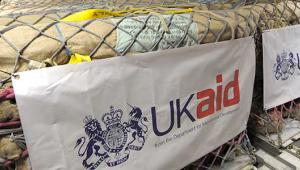Such initiatives, which involve delivering cash handouts rather than aid in kind, have been found to be highly effective by a number of studies in the past few years.
UK tabloid newspapers, however, have caused a furore around them in recent weeks, arguing they are prone to corruption and citing critical politicians who liken them to “exporting the dole” –cash benefits paid to the country’s unemployed people.
In a review published today, the UK’s Independent Commission for Aid Impact gave its backing to the cash transfer programmes run by the country’s aid agency.
The watchdog said that the programmes had consistently increased incomes and consumption levels among some of the world’s poorest people, increased their resilience to shocks and provided a strong case of value for money.
One fault it did highlight was that the programmes were not achieving their full potential, adding that the Department for International Development should consider scaling up its financial contributions to improve and extend access to cash transfers for the most needy.
It awarded the programmes a “green-amber” rating overall, signalling “satisfactory achievement” in most areas but adding that UK aid could do more.
NGOs welcomed the report. Charlie Matthews, head of advocacy for ActionAid, said it confirmed that UK cash initiatives were helping to lift millions of people out of poverty.
Between 2011-2015, DFID reached more than six million people with 28 cash transfer programmes, mostly by supporting national governments’ schemes with direct funding or technical and financial support for system building.
It spent on average £201m per year – around 2% of its total expenditure. Most cash transfer payments were small, amounting to a few pounds per month so each individual or household could supplement incomes without creating a disincentive to work.
As well reducing transaction costs for donors, studies have found cash transfer programmes provided significant benefits for their beneficiaries, boosted local economies and were less prone to fraud and corruption. Most programmes are electronic, with funds paid on to cards or mobile devices, which leaves a digital trail and prevents middlemen from skimming money off the top.
However, an article by UK newspaper the Daily Mail last month targeted this feature of the programmes for criticism in an article titled “queue here for the UK’s £1bn foreign aid cashpoint”.
The article did accurately highlight that no programme is watertight. Looking into a £300m cash transfer scheme in Pakistan, one of its reporters visited the outskirts of the city of Peshawar, where it found villagers who had paid kickbacks to officials to secure cards or had paid others to take out their money as they did not know how to use the technology.
Indeed, ICAI did find some “targeting errors” in DFID’s programmes. It divided these into three categories: targeting that was not focused on the poorest and most vulnerable; exclusion errors, which saw vulnerable groups such as women unable to access programmes quickly; and inclusion errors, where those who were ineligible for programmes found a way to access funds.
These included a “unique case” in a programme for pregnant and breastfeeding women in Nigeria, where fake urine samples were reportedly used to secure funds by women who were not carrying or rearing a child.
The report noted, however, that such errors were “all but inevitable” as local power dynamics, misreporting and seasonal variations “give rise to an unavoidable margin for error”.
Overall, ICAI said the programmes demonstrated good value for money and that there was scope to provide additional funds to help partner countries scale up cash transfer programmes towards national coverage.
Alison Evans, ICAI’s chief commissioner, who led the review, added however that there was “no room for complacency”.
The programmes reviewed did not always achieve their desired results on secondary aims such as improving school attendance, better health and nutrition, and women’s empowerment.
Evans said that in future DFID needed to “do more to improve” matters in these areas, where the global evidence showed cash transfers “can make even more of a difference”.
Stephen Twigg, a UK MP who chairs parliamentary watchdog the International Development Select Committee, said: “ICAI’s review shows the value of DFID’s cash transfer programmes and adds to a wealth of evidence which shows that, contrary to recent coverage, cash transfers are an effective means of development.”
He urged the government to “carefully consider” its options for scaling up and improving its work in this area.














